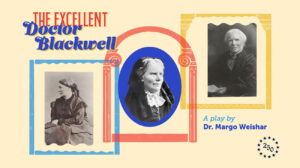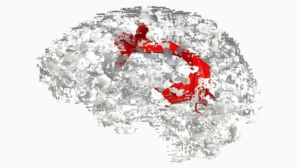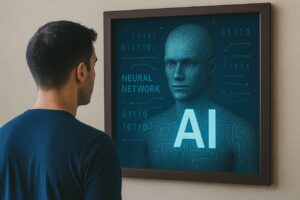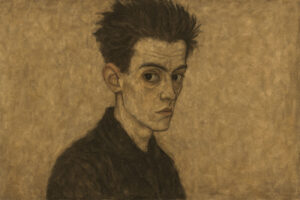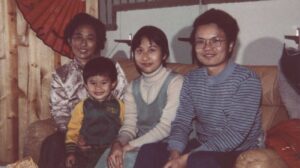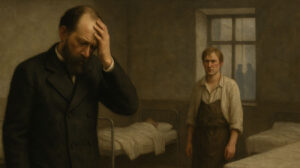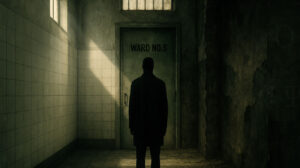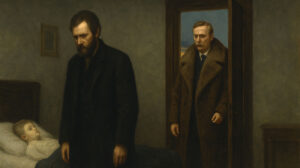In Focus
Every month Medhum highlights timely themes in medicine, culture, and the arts, exploring their impact on human experiences. We want to hear from you! If there are issues and topics you’d like us to tackle, please Let Us Know!
Collapse All | Expand All
2026.02 | Theater
This month we explore how theater illuminates illness, care, and the human condition through dramatic works.
Margo Weishar: The Excellent Doctor Blackwell
Margo Weishar explores Elizabeth Blackwell’s hidden life, ambition, and sacrifice ahead of a public reading.
4:48 Psychosis by Sarah Kane
Sarah Kane’s final play fractures theatrical form to embody depression, psychosis, and the limits of language.
Feeling Dementia from the Play, The Father
Florian Zeller’s The Father immerses audiences inside dementia, transforming theatrical disorientation into visceral understanding and empathy.
Under the Skin, but Out of Focus: Bug on Broadway
Broadway revival of Tracy Letts’ Bug probes paranoia, race, and medical ethics.
2026.01 | Individual in Society
This month we explore tensions between individual rights and societal demands, highlighting courage and resilience amid constraints.
Daughters of the Bamboo Grove by Barbara Demick
International adoption from China arose amid policy-driven abandonment, later fostering trafficking incentives and coerced family separations.
When Your Body Isn’t Yours
This essay examines how policy, culture, and power quietly claim women’s bodies worldwide.
Three Poems by Gary Soto
Three poems explore cultural identity, family conflict, and the influence of media on class, belonging, and cross-cultural understanding.
Pushback: Mary Fissell looks back at 2500 years of abortion history
A sweeping new history examines how societies across millennia have regulated, resisted, and reshaped access to abortion.
2025.12 | Artificial Intelligence
As AI reshapes medicine, culture, and creativity, MedHum reflects on ethics, imagination, and what remains uniquely human.
When Artificial Intelligence Talks but Can’t Touch: Marjorie Prime
As anxieties about AI and mental health mount, a new Broadway drama confronts grief digitally today.
Playground by Richard Powers
A dazzling novel where ocean mysteries, human bonds, and uncertain AI futures intertwine with beauty and suspense.
Shannon Vallor’s The AI Mirror: A Metaphor
Shannon Vallor uses the metaphor of a mirror to reveal how AI reflects and distorts our shared humanity.
Speak by Louisa Hall
A haunting, multi-voiced novel exploring artificial intelligence, empathy, and what it truly means to be human.
2025.11 | Infectious Disease
As Winter approaches we revisit three works with a focus on infectious disease, its human cost as well as its prevention.
Vaccination in Danger
Vaccine pioneer Stanley Plotkin reflects on the growing opposition to vaccination despite its proven, lifesaving impact worldwide.
The Great Influenza by John Barry
John Barry’s The Great Influenza vividly recounts the 1918 pandemic’s medical, social, and political upheavals with novelistic precision.
The End of Days by Bernard MacLaverty
In war-torn Vienna, 1918, artist Egon Schiele faces love, loss, and mortality as the Spanish flu devastates his family.
Stuck By Heidi J. Larson
Heidi J. Larson explores the cultural, moral, and social roots of vaccine hesitancy before the Covid pandemic.
2025.10 | Mental Health
October marks Mental Health Awareness Month, and we spotlight moving narratives that explore struggles, resilience, and healing in illness.
Bibliophobia by Sarah Chihaya
Blending memoir and criticism, Sarah Chihaya’s Bibliophobia explores depression, identity, and the perilous yet healing power of books.
How To Be Depressed by George Scialabba
A candid, unconventional book blending psychiatric records, personal struggle, and practical tips, offering rare insight into living with depression.
The Collected Schizophrenias by Esmé Weijun Wang
This essay collection explores living with severe mental illness, blending memoir, cultural critique, and reflections on resilience, treatment, and identity.
One Friday in April by Donald Antrim
Donald Antrim’s memoir confronts suicide, psychosis, and survival with unflinching honesty, blending personal crisis, hospitalization, and hard-earned hope.
2025.09 | Parenting
The Fall marks the beginning of the school year. To celebrate our children’s return to the classroom, we turn our lens to Parenting.
The Names by Florence Knapp and Flashlight by Susan Choi
Sudden life-altering events shape human experience; The Names and Flashlight explore divergent consequences through contrasting narrative styles.
From Tigers to Otaku
Parenting in Chinese Canadian immigrant families carries both triumphs and struggles, shaping children into overachievers—or isolating, withdrawn adolescents.
Second Life by Amanda Hess
A powerful blend of memoir and critique, Amanda Hess examines pregnancy, technology, and parenting amid modern medicine’s promises and digital noise.
2025.08 | Chekhov
This month we focus on Chekhov, a master of literature and medicine, balancing storytelling and healing brilliantly within a brief 44 years.
Cold Eye, Warm Heart: Medicine and Anton Chekhov
A moving portrait of Anton Chekhov, whose dual life as physician and writer reveals the deep interplay between healing and storytelling.
An Awkward Business by Anton Chekhov
A country doctor grapples with guilt and class privilege after striking his drunken assistant in this tale of conscience and authority.
The Grasshopper by Anton Chekhov
Chekhov’s tragic tale of love, betrayal, and regret, where a devoted doctor’s sacrifice exposes life’s cruel ironies.
Ionych by Anton Chekhov
A provincial doctor’s romantic disillusionment gives way to greed and apathy in Chekhov’s biting portrait of emotional and moral decay.
A Doctor’s Visit by Anton Chekhov
A young doctor’s visit to a factory owner’s daughter reveals the emotional roots of illness through empathy, confinement, and human connection.
Ward No. 6 by Anton Chekhov
A powerful story of disillusionment, *Ward No. 6* explores suffering, detachment, and the psychological toll of a life without meaning.
A Nervous Breakdown by Anton Chekhov
Chekhov’s A Nervous Breakdown follows a law student’s moral collapse after confronting society’s apathy toward the realities of prostitution.
Enemies by Anton Chekhov
A grieving doctor is pulled from his dying child’s side, only to face betrayal, class tension, and moral outrage.
2025.07 | Trauma
This month we continue to explore how the arts and the humanities can help us understand trauma, war and displacement.
Regeneration by Pat Barker
A powerful antiwar novel exploring trauma, identity, and the psychological toll of combat on soldiers and those who treat them.
The Eye in the Door by Pat Barker
A gripping exploration of wartime paranoia, identity, and psychological trauma on the British Home Front during World War I.
The Ghost Road by Pat Barker
A haunting, fast-paced conclusion to Barker’s trilogy, exploring memory, mortality, and symbolic healing against the backdrop of war.
2025.06 | Video Games
This month we spotlight video games, a growing industry shaping people and profoundly influencing the medical humanities.
Forspoken – A Tale of Chronic Trauma
Forspoken blends role-playing, action, and open-world gameplay to tell a magical yet deeply human story about chronic trauma and healing.
The Remarkable Life of Ibelin
A poignant documentary exploring how a young man with muscular dystrophy found profound connection and purpose in virtual worlds.
A Missing Genre: Video Games in the Health Humanities
Video games offer powerful narratives and emotional depth—it’s time health humanities embraced them as meaningful, transformative cultural texts.
The Anxious Generation by Jonathan Haidt
Our digital addiction is reshaping reality, and unless we reclaim real-world connections, the future may be irreversibly anxious.

